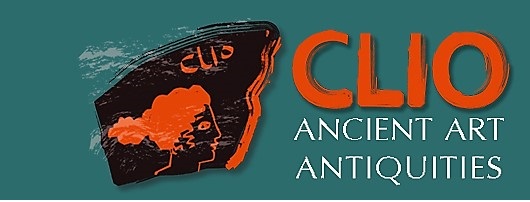This week’s featured object is a lovely marbled glass bottle sometimes referred to as an unguentarium, from “unguent” meaning a salve or ointment, though in the Roman world this would most commonly have been a scented oil either for personal use or for funerary rites. Reassembled from a few large fragments, like most of its kind, it is complete, measuring 10.2 cm (4 inches) in height, and dates to the early 1st Century AD.

The development of glass blowing made glass a common and affordable commodity rather then the preserve of the wealthy. As a result, blown glass unguentaria have survived in countless forms. The Corning Museum of Glass’ printed and online catalogs of unguentaria list dozens of distinct variations, though the great majority of these appear in plain, transparent, uncolored or naturally pale blue-green colored glass. What sets this glass vessel apart from others is its distinctive marbled glass. In this case, the semi-opaque glass is yellow and white, the white having been derived from antimony and the yellow from antimony and lead.
Throughout the Roman Republic and into the Augustan era Roman glass was still dominated by Hellenistic glass making techniques, focusing on opaque colored glass and utilizing time consuming and expensive techniques such as core forming, casting and slumping. The object featured in this article marks a moment of transition, with the introduction of glass blowing and a new preference for colorless transparent glass, and away from the older Hellenistic approach. It combines the new glass blowing technique with a lingering preference for colored glass. This combination allows the object to be dated to a narrow range of a few decades, from about AD 20-60.


To acquire this fine ancient Roman marbled glass vessel, visit it on Clio’s Etsy shop here –
https://www.etsy.com/listing/265344324/rare-roman-glass-marbled-unguentarium?ref=shop_home_feat_4
or Clio’s eBay store here –

